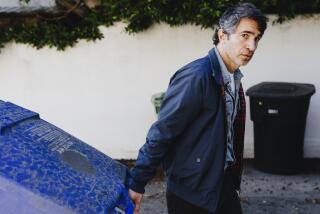‘Trace’ lets LaPaglia’s agent loose again
- Share via
TONIGHT on CBS’ “Without a Trace,” the suit comes off, and Anthony LaPaglia’s Agent Jack Malone looks grateful and drained, as if he’d just crossed a desert for the privilege. Working undercover, he lets a cigarette dangle at an absurd, leisurely angle and, when kidnapped himself, calmly sweet-talks his stiletto-booted abductor. He peels off lines from “Silence of the Lambs” (“I’ll put the lotion in the basket, lady!”) as if there were nothing more natural than being duct-taped to a chair, staring down the wrong end of a nail gun.
Anything to get out of the office.
As far as team leaders on procedurals go, LaPaglia’s Malone is an original. Not clinical like “CSI’s” Gil Grissom (William Petersen) or faux slick like Horatio Caine (David Caruso) on “CSI: Miami” or just plain pretty like Lilly Rush (Kathryn Morris) on “Cold Case,” Malone is on-the-verge and frighteningly loose. As the show’s seasons have progressed (it’s now in its fifth) he looks more and more as if he’s unraveling -- held together by his suit, which is just a hair tight, and a broad-collared shirt out of which his head seems to be bursting.
LaPaglia is never better than the scenes in which he’s staring someone down from across the FBI interrogation table, when it seems that a small earthquake is occurring just underneath the skin of his face. He’s a study in contrasts: a brute who carefully chooses whom he antagonizes; a soft man who’s impossibly tough; full of hypermasculinity that’s somehow nonsexual.
And, natch, the type of investigator who’s all too eager to let his personal feelings interfere with the execution of his work, so long as justice is served. One of last season’s most poignant moments came when, after tracking down a young boy who’d witnessed a murder, Malone confronted the Albanian mob boss who had masterminded the killing and gotten away. After a brief conversation, he attacked the man, relieved him of his gun and put it to the boss’ temple, promising retribution should he ever decide to revisit the situation.
Similarly, in this season’s fourth episode, when Malone was squaring off with a security guard at a girls’ detention center who sidelined as a pimp, his eyes were wet -- not with tears, but with the glazed look of the slightly deranged. Yet rather than play Malone as a loose cannon, LaPaglia makes him righteous. It’s a smart stroke for a character perpetually grappling with time pressures (“Trace” deals with missing person cases). He never fully loses control but always projects as if he might -- the better to encourage expediency in others.
LaPaglia, who is Australian, is best known for his work on “Trace,” which has earned him a Golden Globe (but no Emmy). And although the show is popular, it rarely attempts to address large social or political ideas. (A recent episode, the show’s 100th, focused on a Hurricane Katrina survivor gone missing, but apart from some brief histrionics and re-created floodwaters, the case was much like any other.)
Often, it seems as if the entire show has been engineered to showcase a bruised and bruising Malone -- the rest of the cast is amiable and competent, but few exude heat. Until tonight, though, Malone’s been downplayed this season, at the cost of some of the show’s passion. A recent episode in which he helps track the son of the aforementioned Albanian mob boss didn’t pack nearly the punch of the previous one in the arc, largely because LaPaglia traded his unhinged air for mental chess. And though he’s happy to simmer, he’d clearly much rather erupt.
More to Read
The complete guide to home viewing
Get Screen Gab for everything about the TV shows and streaming movies everyone’s talking about.
You may occasionally receive promotional content from the Los Angeles Times.






